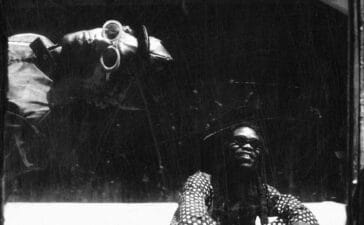The Dillinger Escape Plan’s Dimitri Minakakis talks ‘Jim Fear’, cryptic lyrics, and the enduring chaos of Calculating Infinity.
“I’ll tell you what ‘Jim Fear’ is about. How about I’ll give you this? I’ll give you something, baby. ‘Jim Fear’ is, basically… it’s about that shut-in that just doesn’t leave the house and is a complete degenerate pile of trash human being,” The Dillinger Escape Plan’s Dimitri Minakakis says.
‘Jim Fear’, I wish I hadn’t said, has always felt deeply personal to me for reasons I wish I didn’t now understand.
“It’s just about a lonely person and with no hope. And, like, that’s that in a nutshell. So if you say that it’s deeply personal to you, that’s quite revealing. And, also, I think, interestingly Jim Fear is not about me, though. I can never say who ‘Jim Fear’ is about. I think I would get my teeth kicked in,” he adds.
Is Jim… Benjamin? “No,” Dimitri says, I like to think unconvincingly. “Look at you, all digging for info.”
Fuck the numbers, what do the words mean? I’ve been hounding Dimitri Minakakis about this for 15 minutes. Calculating Infinity’s rotten lyrical abstractions are as haunting as its legacy. Mathcore’s First Common Ancestor was also The Dillinger Escape Plan’s full-length 1999 debut – and the only LP they wrote and recorded with their OG vocalist before Dimitri retired to a much less volatile life in 2001.
He miraculously returned circa 2023 to fill the void left by his successor (and friend), Greg Puciato, in 2017. The void grew back its first set of teeth, seizing the chance for The Dillinger Escape Plan to tour the world one last time with Calculating Infinity at its core. This is my big and only chance to seek Dimitri’s secrets with The Man himself. The Man, like every The Man, shuts me down.
“I saw an interview with Quentin Tarantino about a year or two ago,” Dimitri says. “And he was saying people always ask him about Pulp Fiction. What’s in the suitcase? Why does it glow? Why is the combination six-six-six? And with Inglorious Bastards, Brad Pitt had a rope burn on his neck. Never explained why in the movie.”
“Quentin’s view of that was, like: I want the audience to create their own story with the story I’m presenting to them. It’s interactive. It’s their interpretation of the form I’m giving them. When he said that, damn. I’ve been agreeing with that this whole time,” he says.
“I feel it’s just like when you see an abstract painting. What do you see? That’s the part of the art I like about it. A lot of lyrics are about myself and my experiences with other humans that you you walk amongst. How do they make you feel? What do you resent that person for? How did you let that one person go because you made a mistake? If I tell you what it’s about, and it’s personal to me, then I’ll ruin it for you.”
Spoken like a true graphic designer. My dreams of finally calculating infinity are 43% burnt.
“I love that song,” Dimitri says. “I love playing Abe the Cop. Not just because of the lyrics, but how the structure of the song makes me feel. And playing it live is so much fun. So, you know, if someone’s watching a song live and they’re like, ‘I love how that song hits,’ that’s the perfect experience I can ask somebody as a listener to have. I think we’re playing six or seven shows in Australia, so we’ll do a different set list, hopefully each night. We’ll play Under the Running Board. We might throw a couple cover songs in, make it fun. We’ll play the entire Calculating record, not in order. We’ll definitely play Variations.”
Dimitri says ‘Variations on a Cocktail Dress’, Calculating Infinity’s closing song, is infamous because “by the time I was out of the band, I realised I’d never played that song live.”
“That was one of the last songs [The Dillinger Escape Plan] wrote. That was finished up in the studio. And then when we were done recording, we started touring right away. We never got around to working on it, practicing it. It’s just one of those things that fell through the cracks. They’ve played it with Greg maybe a handful of times!”
If Calculating Infinity had a golden suitcase Pulp Fiction moment, it would be the end of ‘Variations on a Cocktail Dress’. At 5:17, the secret noises begin. At 6:53, a distressing Hollywood exchange takes place.
“You know what that is? That is classic ‘90s music where using samples was just, like, the shit,” Dimitri says. “That was the thing to do. We don’t know why that was on there. It’s just there. We just felt a need. That’s from, l think, a Helen Keller movie or something. Using obscure samples was the fucking thing to do. Like, Converge did it with Sixteen Candles where there’s a break in one of the songs off the Agoraphobic Nosebleed split. We were all one-upping each other with inappropriate samples.”
Speaking of samples, Dimitri posted a picture of a mic stand to his Instagram earlier in the year.
“I did. That was just me rehearsing,” he says, I like to think unconvincingly.











